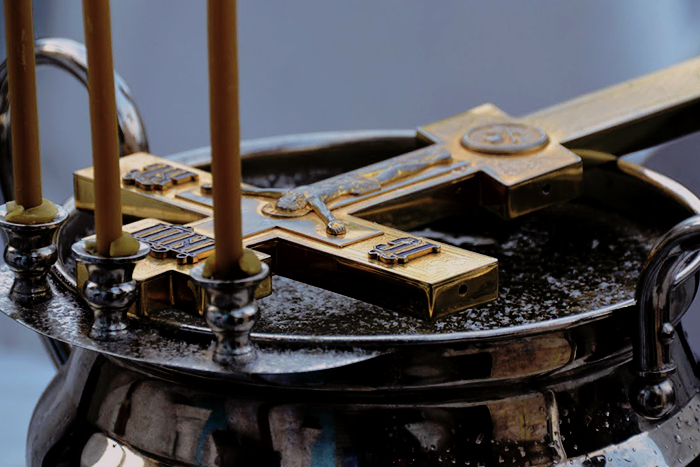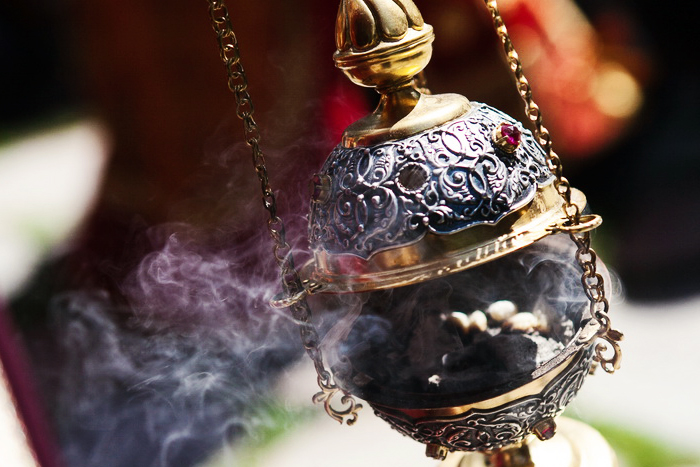
The rite of the blessing of water is directly derived from the baptism of our Lord Jesus Christ in the Jordan River. The Church sees this Gospel event not only as the mysterious cleansing of sins but also the actual consecration of all water, the very nature of water, through the immersion of God incarnate.
In addition to the great blessing of water, performed only on the Feast of Epiphany, there has been the lesser blessing of water in the Orthodox Church since ancient times. According to tradition, it was established by the Apostle Matthew. The Church performs this rite in memory of the blessing of water by an angel in the Pool of Siloam. The ancient origin of the rite of the lesser blessing of water is confirmed by Alexander, the Roman Pope martyred during the reign of Emperor Adrian (118-138), who wrote that the blessed water “tears apart the nets of sorcery and drives away demons.” Balsamon, Patriarch of Antioch, who lived in the 12th century, mentions lesser blessing of water as an ancient custom in his commentary on the 65th Rule of the Sixth Ecumenical Council. He points out that the Fathers of this Council ruled to carry out a lesser blessing of water at the beginning of each month in opposition to the pagan observance of the new lunar month which had been preserved for a long time among Christians, and included customs like bonfires, over which “by some strange custom they leap madly”. The rite of lesser blessing of water was given its present form by Photius, Patriarch of Constantinople, in the 9th century.
Almost all the prayer chants in the rite of the lesser blessing of water are addressed directly to the Blessed Virgin Mary, who has been referred to as the Life-Giving Spring and Joy of All Who Sorrow since ancient times. Some of the hymns suggest that the lesser blessing of water was originally carried out in churches dedicated to the Mother of God. For example, in the troparia of the rite, the Church exclaims, “Thy temple, Our Lady, shines forth, granting free healing of ailments and consolation of insulted souls… Whoever comes into Thy temple, Our Lady, will soon be healed, both mentally and physically… O Christ, who hast poured water onto the source of healing in this all-honorable temple of the Virgin by the sprinkling of Thy blessing, to drive away the infirmities of the sick, O Doctor of our souls and bodies.”
The Church does not restrict the lesser blessing of water to a particular day or place. It can be done at any time according to an established tradition or at the request of believers where it is deemed necessary – in a church, in the homes of parishioners, or – in certain cases – in the open air. Since ancient times, the Church has established two days during which lesser blessing of water in rivers, streams and other water bodies is to be carried out. It is on August 1 – the Procession of the Precious Wood of the Life-giving Cross of the Lord, and on the Bright Friday. In addition, the lesser blessing of water is to be performed on Wednesday of the fourth week after Easter, on the day of mid-Pentecost, when the Church remembers the most profound and mysterious words of the Savior, which He said to the Samaritan woman, “But whosoever drinketh of the water that I shall give him shall never thirst; but the water that I shall give him shall be in him a well of water springing up into everlasting life” (John 4:14). In some churches, lesser blessings of water are performed on the Feast of the Meeting of the Lord; they are also held on patron saints’ days in all churches, during which the churches are renewed with prayer and sprinkling. There is a lesser blessing of water in the homes of parishioners at the foundation or blessing of a new house, combined with a moleben.
Translated by The Catalogue of Good Deeds
Source: https://azbyka.ru/otechnik/Gennadij_Nefedov/tainstva-i-obrjady-pravoslavnoj-tserkvi/9_4



